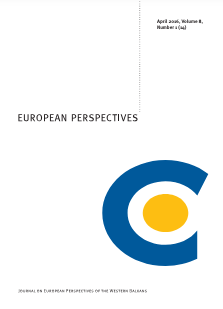The Euro-Atlantic Integration in the Whirlpool of Geopolitics: the Case of Montenegro
The Euro-Atlantic Integration in the Whirlpool of Geopolitics: the Case of Montenegro
Author(s): Srđan OrlandićSubject(s): Politics, International relations/trade, Security and defense, Geopolitics, Peace and Conflict Studies
Published by: IFIMES Mednarodni inštitut za bližnjevzhodne in balkanske študije
Keywords: geopolitics; NATO; Russia; Montenegro; enlargement;
Summary/Abstract: NATO Foreign Ministers on December 2 2015 adopted a decision to invite Montenegro to begin with accession talks in order to become the 29th member of the Alliance, which represented a confirmation of the NATO’s commitment to the enlargement process and integrating the Balkan peninsula under its umbrella. The invitation for Montenegro to join NATO provoked prompt reactions from Russia, which are in line with the known Kremlin standpoint that NATO expansion to the countries of Eastern Europe is part of project to isolate Russia and constrain its strategic interests. Hence, Montenegro’s Euro-Atlantic aspirations made this Western Balkan country an additional piece of mosaic of the contemporary geopolitical confrontation between the Russian Federation and NATO. Even though there is a firm academic movement that advocates the decrement of significance of geopolitics, the contemporary relations in the international community and its challenges (Ukrainian crisis, the Middle East, South China Sea, Daesh, migration crisis, etc.) confirmed that geopolitics still represents a major factor in international relations. The Montenegrin case shows that NATO enlargement depends on the understating of geopolitical repercussions, and less on the required institutional reforms. Therefore, the objective of this paper is to single out the correlation between the Euro-Atlantic integration/NATO enlargement and geopolitics. As the title indicates, this paper will develop its hypothesis by using the case study method and the research will be conducted by elaborating on specific interest and benefits that NATO and Russia have, along with the analysis of its foreign policies, with a particular focus on the public appearances and statements of high officials.
Journal: International scientific journal European Perspectives
- Issue Year: 8/2016
- Issue No: 1 (14)
- Page Range: 89-113
- Page Count: 25
- Language: English

